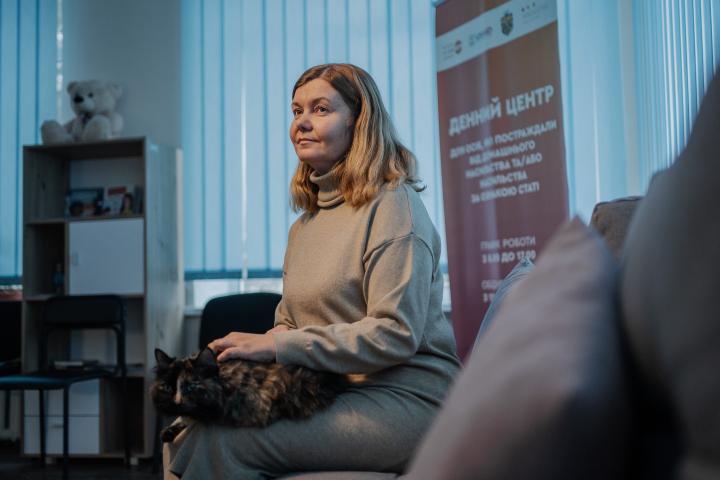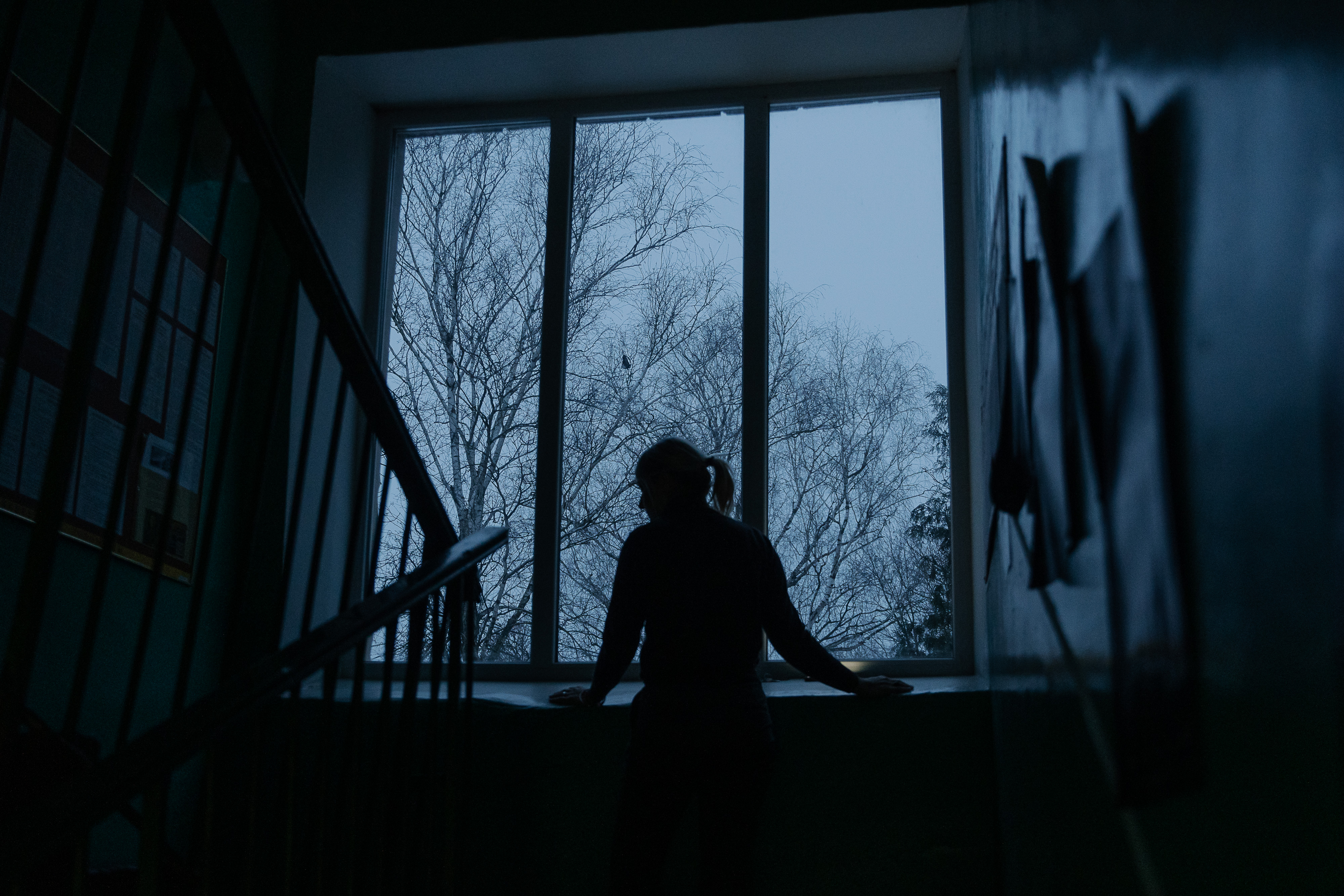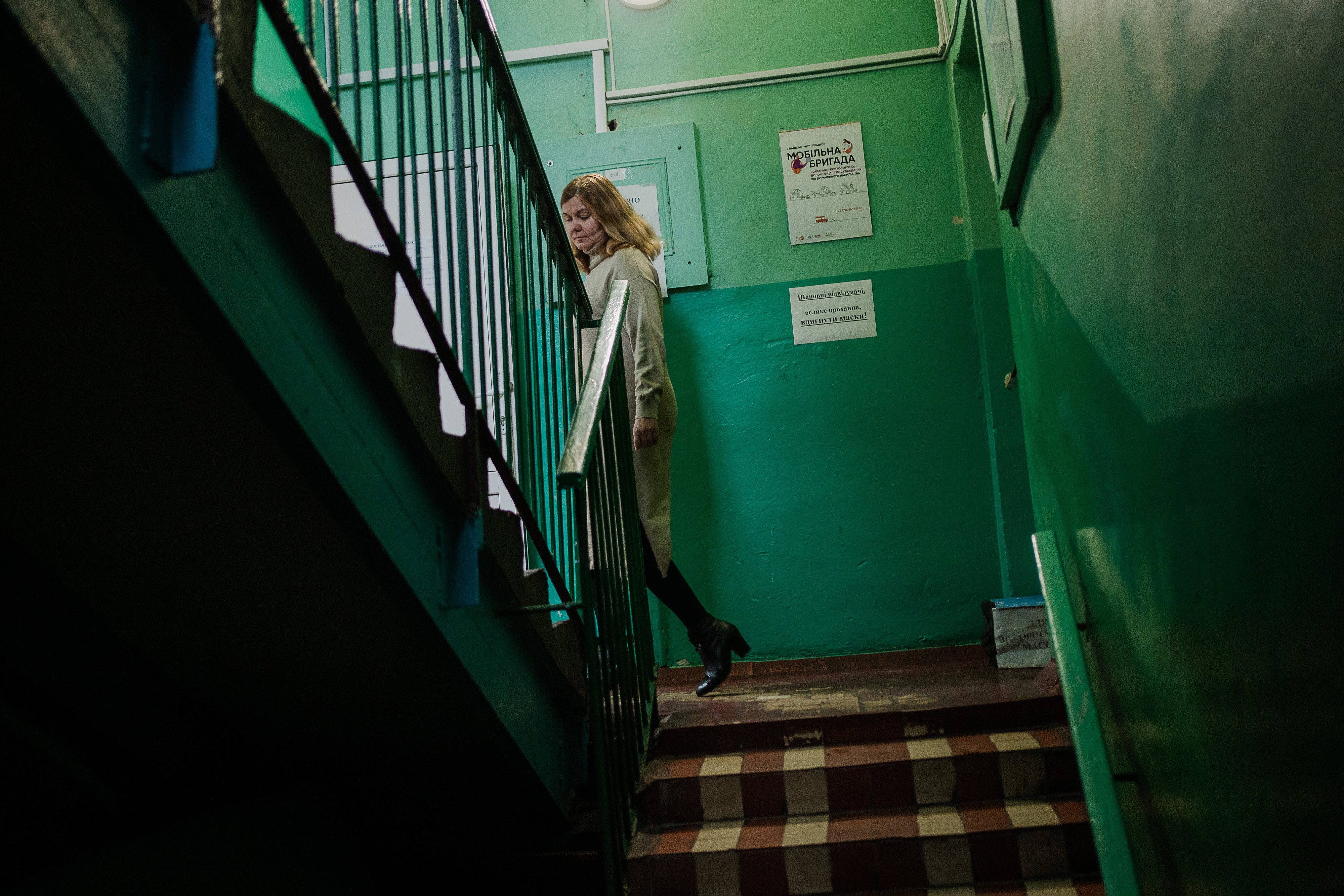“Violence has no place in Ukraine’s future”
December 9, 2023

Liudmyla Kuts, director ad interim, Nizhyn Сentre of Social Services, Chernihiv Oblast.
Liudmyla Kuts, 46 years old, is the acting director of the Nizhyn Сentre of Social Services in Chernihiv Oblast. For more than 15 years, Ms Kuts has devoted herself to work in the social sphere, focusing on preventing and fighting domestic and gender-based violence,* and making this her life’s mission.
Liudmyla shared her insights with us on how to navigate the field of social work in a context of war and how eventually strength can be found to break the cycle of violence.
Before the Russian Federation’s full-scale invasion of Ukraine, the centre where Liudmyla works was working as usual: specialists assisted families in distress, conducted preventive work in communities and provided psychological assistance to women grappling with violence.
“When a woman facing violence reaches out to us, recognizing her fragile state is crucial. Choosing the right words and building trust by assuring we are here to help are paramount,” Liudmyla says.
“Trust is the key, nothing will work without it,” she says.
A team of psychologists, social workers and lawyers work at the Nizhyn Centre, which uses an individual approach to each of the women who seeks help. The centre also has a crisis room where women, often with children, can find temporary refuge from the abuser and recover emotionally. The United Nations Development Programme (UNDP) with funding from the European Union, helped to equip the day centre at the Nizhyn centre of social services, as well as the crisis room.

Luidmyla and her team at the centre in Nizhyn. Photo credit: Danylo Pavlov / UNDP in Ukraine

Luidmyla at her workplace at the centre in Nizhyn. Photo credit: Danylo Pavlov / UNDP in Ukraine
This is one of many initiatives that UNDP supports in five oblasts of Ukraine — Chernihiv, Zaporizhzhia, Dnipropetrovsk, Poltava, and Zakarpattia — to help communities more effectively combat violence. In particular, with UNDP support, 19 communities have already joined the “16 days against violence” campaign this year. Also, UNDP is systematically conducting educational training in communities so that they can more effectively prevent violence against women.
Before the war, with UNDP assistance, nine shelters were opened in Donetsk and Luhansk Oblast, to provide temporary shelter to women who survived violence.
“I love helping people, and that’s why I love my job. It’s a simple philosophy, but it inspires me and fills me with strength,” says Ms Kuts about her motivation.
“We often work with complex cases. One thing works, another doesn't. My heart aches every single time when a woman, for various reasons, cannot get away from an abuser. We cannot force her. It should be her decision. You must find strength to do it.”
“However, despite the difficulties, no matter how hard the decision is, one should not be afraid to ask for help,” Liudmyla emphasizes.
“We are always here, ready to help.”

Luidmyla holding a cat that was found a home by centre staff in Nizhyn. Photo: Danylo Pavlov / UNDP in Ukraine

A cat that was found a home by centre staff in Nizhyn. Photo credit: Danylo Pavlov / UNDP in Ukraine
Liudmyla says that over her years of working in this field, she has seen many positive and systemic changes in society.
“The stateʼs interest in this problem has increased. Ukraine has ratified the Istanbul Convention, and violence is not covered up, and offenders are punished more often.”
“Offenders must be punished, there is no other way to stop them.”
Liudmyla said that although the war has disrupted the centre’s work, it did not stop it. She reported that the first days of the full-scale invasion were very terrifying indeed, but when she realized that her team had stayed right beside her, the fear disappeared.

Sofia (the woman’s name has been changed for security reasons) found shelter in the centre after the war had started. Despite the difficulties in her life, she speaks very positively about the help she received here.
“I suffer from violence at home every day. I did not even expect that the mobile team would come so quickly and organize the departure. Very polite and lovely people work here [in the centre — ed.]. And the most important thing is that I am gradually recovering from the distress that I was in at home.”
“Unfortunately, with the war, there have been many more requests for help from women. This is sad, but it motivates me to work even harder. I understand that my team and I are needed. Our help is timely: people are counting on us,” Liudmyla continued.
“There are 18 people in the team. Nobody went anywhere because of the war. Everyone stayed and kept working – from the cleaner to the finance accountant,” she added.
She admits that work has become more difficult. It is difficult to step away from the war.
“War is not normal. I refuse to accept this reality: I don’t want to. In the city, they bury two people a day now. How can this be normal? It is very difficult for us all.”

Ms Kuts going up to her office at the centre in Nizhyn.
However, Liudmyla looks to the future with great optimism and hope.
“Everything comes to an end, and so does war. It will end with our victory, I believe it. And I also believe in the future of Ukraine, where we can love and raise our children, building our own country. Violence has no place in the future, in any of its forms.”
*Gender-based violence is a human rights violation linked to inequality of rights and opportunities that most affects women and girls. The Declaration on the Elimination of Violence Against Women, issued by the United Nations General Assembly in 1993, defines violence against women as “any act of gender-based violence that results in, or is likely to result in, physical, sexual or psychological harm or suffering to women, including threats of such acts, coercion or arbitrary deprivation of liberty, whether occurring in public or in private life.”

 Locations
Locations



